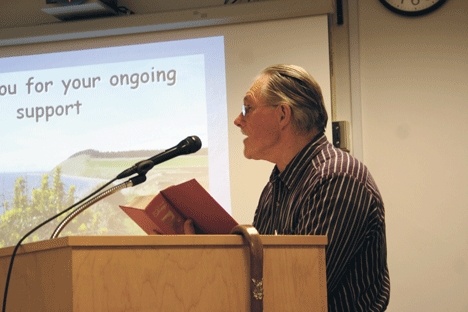People drove as far as 25 miles to a county commissioners’ meeting in Coupeville Wednesday night to protest a proposed $5 assessment on parcels of land that would fund the two conservation districts that serve Island County.
The irony wasn’t lost on Oak Harbor resident Tim Verschuyl, who speculated that some of the 50 or so people who attended the special meeting probably spent that much money to drive there.
“Times are tough for me too, but I would be glad to pay the $5 tax,” he said. “It cost me that much to come to this meeting.”
But those opposed to the proposal made it clear that their opposition to the assessment — which is actually $5 a parcel plus 5 cents an acre each year — was more than just philosophical. South Whidbey resident Rufus Rose said to suggest that the amount of money was frivolous was “insulting.”
Anita Dragoo of Coupeville held a “Tea Party” sign outside the meeting to protest the possible tax increase. She also spoke inside.
“It’s just tax, tax, tax and I live on a pension and I don’t have any way to increase my income,” she said.
Freeland resident Jennifer Martin was one of several people who warned that the timing for the fee was bad.
“You are going to have a tax revolt on your hands and people are going to vote you out of office,” she said.
Other members of the audience warned of possible lawsuits or a petition drive if the assessment is passed. Yet based on the meeting, the community is very much divided on the issue. Of the 28 people who spoke, 14 were in support and 14 were against.
“This economic time is short term. The environment is forever,” said North Whidbey resident Sarah Richards, a proponent of the assessment.
The meeting was the first public hearing the county commissioners have held on the proposal, though the two conservation districts had three public meetings in July. The commissioners, who will make a final decision on the proposal, will hold another meeting on Camano Island Oct. 20.
Commissioner John Dean said the earliest the commissioners could make a decision is Oct. 26.
At the beginning of the year, the Whidbey Island Conservation District and the Snohomish Conservation District, which serves Camano Island, proposed a special yearly assessment of $5 per parcel of land, plus an additional 5 cents per acre. It would be charged to all parcels in the unincorporated county and within Oak Harbor, Langley and Coupeville, except those not subject to property taxes or land zoned “rural forest” under the county’s zoning code.
Karen Bishop, manager of Whidbey Island Conservation District, started the meeting with a presentation about the district.
She explained that each of the 47 districts in the state work on a local level to help landowners preserve natural resources. Each district has a mission specific to the natural resources that are in the area.
“In Puget Sound districts, we’re concerned about water quality issues and water quantity issues,” she said.
The district is probably best known for working with farmers to enact “best management practices” to protect the environment. She said there are currently 458 farms in the county; they average 39 acres in size.
But Bishop explained that the district volunteers and staff, with two full-time and two part-time employees, do work that affects both rural and urban residents. They provide natural resources planning and technical assistance; educate about low-impact development; work to preserve sustainable farm and forest land; and perform public outreach.
“We work one-on-one with landowners at their request in a non-regulatory way,” she said.
North Whidbey resident Jim Foxgrover said the district helped him take care of his property.
“We live in a special land,” he said. “I’m not sure all of us are aware of how blessed we are.”
If adopted, the assessment would bring in an estimated $240,000 a year. Bishop said it would provide a stable source of funding for the agency, which has relied on grants.
Several people in the audience argued that the conservation districts should continue relying on grant funding.
“These entities need to continue receiving their money from grants that are already available, not from Island County residents struggling to keep food and their tables and roofs over their heads,” said North Whidbey resident Charlona Sawyer.
But Stu Trefry, a regional manager for the Washington State Conservation Commission, explained that grant funding almost always comes with strings attached, which erases the independence of the local districts to take on local issues.
“It’s a pot of money that really isn’t there to address the priorities of Whidbey Island,” he said.
Bill Carruthers, speaking as the chairman of the Island County Republican Party, urged the commissioners not to adopt the assessment.
At the end of the meeting, Fran Einterz, co-chair the Whidbey Island Conservation District board, tried to answer the arguments against the assessment, noting that nobody questioned the need for the conservation districts.
“Everybody supports our mission, but nobody wants to pay for it,” he said.



